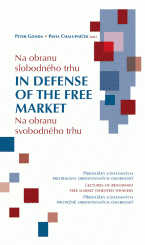 |
|||||||
| INSTITUTE | CONSERVATISM | M.R.STEFANIK |
| NEWS
|
[06.07.2010, The Slovak Spectator, NEWS]
... “The conditions of Slovakia’s participation in the EFSF were negotiated by the government of Fico without consulting on the issue with representatives of other parliamentary parties, despite the fact that the European Union agreed on this package one month before the parliamentary elections,” Ivan Kuhn of the Conservative Institute think tank told The Slovak Spectator. According to Kuhn, Fico knew there was a possibility that after the elections power could change hands and that Slovakia might get a new government made up of different parties. “And this new government would take over responsibility for Slovakia’s participation in this mechanism and the new parliament would have to approve Slovakia’s share in it,” Kuhn said. “In the parliament, we still have a strong committee for European affairs, which could negotiate such important agreements and obligations.” Fico insisted that his existing government only has a formal mandate. He also stressed that the centre-right parties clearly declared ahead of the parliamentary elections that they disagreed with the measures. “It is unavoidable that they take responsibility for the rule they are preparing for,” said Fico, who rejected pre-election calls for a debate on Slovakia’s proposed €800-million contribution to the Greek bailout. There was intense debate in late June about the impact that a Slovak rejection could have on the functioning of the eurozone mechanism. “The European Financial and Stabilisation mechanism can work in terms of [its] legal and economic aspects without Slovakia,” Kuhn said. “Slovakia’s contribution is only a small fragment of the financial package. Yet the rescue package was created de facto beyond the legislative framework of the EU, so the presence of all the EU members is not necessary.” Počiatek warned that it is “no game with balls in the sand” and that the possible consequences of Slovakia’s rejection could be serious. Observers are divided on the possible effect of an eventual Slovak “no”. Some say it could turn Slovakia into the black sheep of Europe, while others have opined that the practical impact would be minimal and that the political aspect of the issue is much stronger than the economic one. According to Kuhn, a Slovak “no” would mean that the country would make the cover pages of European dailies for a couple of days and that some European leaders would address sharply critical comments towards Slovak politicians. Kuhn also suggested that if Slovakia were to lobby at the EU level for some specific demands in the future it might meet with a rather frosty response. “But in no way do I agree that Slovakia in such a case would find itself rejected by the rest of the EU and that we would be punished,” Kuhn told The Slovak Spectator. “This is something that the EU and its member countries cannot afford to do to another member country.” Kuhn also said that the creation of the European Financial Stabilisation mechanism without Slovakia’s participation is not a serious problem for the EU on a practical level. “It is a problem at a political level because the politicians who proposed such solutions will no longer be able to tell their opponents that such a solution is the result of a consensus across the whole European Union or the whole eurozone,” Kuhn told The Slovak Spectator. “Undoubtedly, within the eurozone voices will grow stronger so that the situation is solved in such a way that those “guilty” [of excess spending] would pay a toll for their budgetary policies.” According to Kuhn, a Slovak “no” would probably inspire a discussion about whether countries that observe the rules of the eurozone, even at the price of carrying out tough reforms that have a negative short-term impact on part of the population and could contribute to the fall of the governments that undertake them, have a moral duty to contribute to the rescue of countries that have pursued populist rather than responsible budgetary policies. As for how Slovakia’s decision might be perceived by other member countries, Kuhn says that if Slovakia is going to be the only rejecting country, it would certainly attract criticism from those who contribute a share to the mechanism. “On the other hand, perhaps in every country of the eurozone there are also critical voices, either in political or in economic circles, as regards the mechanism and these would obviously appreciate Slovakia’s rejectionist attitude,” Kuhn said. “A considerable part of the eurozone disagrees that those who keep the rules of the eurozone must pay for those who are violating or have violated these rules.” ... Beata Balogová. Article was published in the Slovakia`s English-language weekly The Slovak Spectator. Read the whole article here. |
 English | Slovak
English | Slovak
This website was created also thanks to funding granted by The Trust
for Civil Society in Central and Eastern Europe.
Website powered by Metafox CMS from Platon Group.
|
Conservative Institute of M. R. Stefanik |
Tel.:
+421 258 100 188 |

 Eyebrows are being raised in Europe over a tug of war taking place in Slovakia over whether to agree to participate in the European Union’s financial safety-net programme to support the eurozone. The outgoing Robert Fico-led government and its finance master, Ján Počiatek, declined to give the country’s consent to what the EU calls the European Financial Stabilisation Facility, a programme worth €750 billion, without the approval of the four-party right-wing coalition which will form Slovakia’s next government.
Eyebrows are being raised in Europe over a tug of war taking place in Slovakia over whether to agree to participate in the European Union’s financial safety-net programme to support the eurozone. The outgoing Robert Fico-led government and its finance master, Ján Počiatek, declined to give the country’s consent to what the EU calls the European Financial Stabilisation Facility, a programme worth €750 billion, without the approval of the four-party right-wing coalition which will form Slovakia’s next government.





